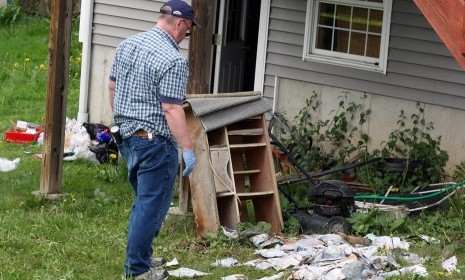The private life of Faisal Shahzad
How did an "average" suburbanite become an alleged jihadist? The media is finding clues in the Times Square bomber's web habits, his handwriting, even his fridge

A free daily email with the biggest news stories of the day – and the best features from TheWeek.com
You are now subscribed
Your newsletter sign-up was successful
The news media has taken to digging through Faisal Shahzad's personal life, his garbage, and his fridge to understand how "an average student in college, an average employee in the workplace, an average neighbor in suburbia," became an alleged would-be mass murderer. (Watch a CBS report about Faisal Shahzad's private side.) Here's a taste of what intrepid reporters have uncovered, and what it might mean:
What was his family life like?
Shahzad wed Colorado-born Huma Mian in Peshawar, Pakistan, six years ago, in an arranged marriage between two prominent Pakistani families. Shahzad's father, Bahar ul-Haq, is a retired high-ranking general in Pakistan's air force, and Mian's father wrote a best-selling book on Project Economics and Decision Analysis. Mian has a degree in accounting from the University of Colorado, and the couple has two young children.
The Week
Escape your echo chamber. Get the facts behind the news, plus analysis from multiple perspectives.

Sign up for The Week's Free Newsletters
From our morning news briefing to a weekly Good News Newsletter, get the best of The Week delivered directly to your inbox.
From our morning news briefing to a weekly Good News Newsletter, get the best of The Week delivered directly to your inbox.
What did he and his family do for fun?
Until about a year ago, it seems, their (not particularly radical) diversions included watching Hollywood hits (Up in the Air) on DVD, oil-painting, and shopping. "They really loved Kohl's and Macy's," says Shelton neighbor Brenda Thurman, who characterizes Mian as a bit of a clotheshorse. Shahzad liked jogging at night in all black attire.
What can we learn from their social networking?
On Orkut — a global online community with a big presence in India and Brazil — Mian lists "fashion, shoes, bags, SHOPPING!!" as her interests, and "Everybody Loves Raymond" and "Friends" as her favorite TV shows. She speaks four languages: English, French, Pashto, and Urdu, and says she's apolitical. A photo she posted of her husband ("he's my everything") has led observers to conclude that he over-indulged in hair gel and kept his narrow beard "meticulously neat." His online résumé, three-pages long, is set in the ubiquitous font Georgia.
A free daily email with the biggest news stories of the day – and the best features from TheWeek.com
And his actual handwriting?
The New York Daily News asked a graphologist to analyze Shahzad's signature (see sample and analysis here). The expert sees evidence of anger (checkmark-like "ticks"), a focus on religious matters (letter forms that reach lofty heights), and a bizarre need to stand out (a "curlicue" in lieu of an i-dot).
Was Shahzad in financial trouble?
High-level U.S. officials and family friends in Pakistan say yes. Reportedly, Shahzad had quit his financial-analyst job and abandoned his in-foreclosure home. Citing a $65,000 home equity loan that Wachovia granted Shahzad in early 2009, University of New Haven psychologist James Monahan speculates that Shahzad was living above his means. (Why, wonders The Washington Post's Moe Lane, would Wachovia even approve the loan if that were true?)
Was he religious?
Not until the past couple of years, according to friends. His wedding featured co-ed dancing, and he apparently didn't pray at at work. "The Faisal with the beard" is not "the old Faisal," says Faiz Ahmad, a family friend in Pakistan. "He was like you, like me, handsome, liberal and an active person."
What was in his fridge?
According to one of the prosaic captions in the New York Post's exhaustive slideshow of the Shahzad's kitchen, "Eggs and flat bread dominate the refrigerator." Also noted: Fat-free milk, bread, yogurt, Gatorade, Entenmann's poundcake, and a Starbucks Frappuccino bottle. Pantene conditioner was a bathroom favorite.
Does this obsessively reported minutia actually clarify anything?
Not really, says Gawker's Maureen O'Connor, who admits, nevertheless, that even "anecdotal, bullshit-laced" so-called analysis is fascinating. "It's hard not to obsess over these details," she adds. "What is ultimately so terrifying about [them] is that they are so unremarkable. Terrorists: A superficial glance into a stranger's kitchen won't protect you from them."
Sources: New York Times, Connecticut Post, Washington Post, NY Post, Wall Street Journal, Gawker, Christian Science Monitor, AOL News, New York, Talking Points Memo
-
 Political cartoons for February 7
Political cartoons for February 7Cartoons Saturday’s political cartoons include an earthquake warning, Washington Post Mortem, and more
-
 5 cinematic cartoons about Bezos betting big on 'Melania'
5 cinematic cartoons about Bezos betting big on 'Melania'Cartoons Artists take on a girlboss, a fetching newspaper, and more
-
 The fall of the generals: China’s military purge
The fall of the generals: China’s military purgeIn the Spotlight Xi Jinping’s extraordinary removal of senior general proves that no-one is safe from anti-corruption drive that has investigated millions